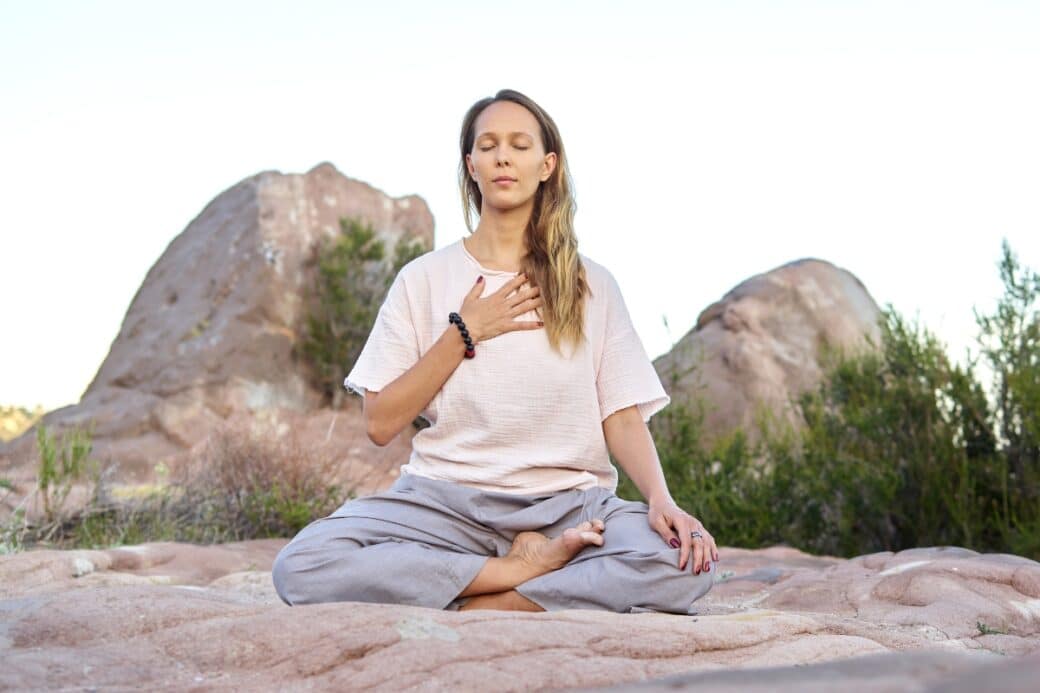Are you feeling overwhelmed by anxiety? Struggling with constant stress and worry? Look no further, because the answer may lie in the power of meditation. In this article, we will explore the benefits of meditation for anxiety and how it can help ease stress and worry. With its soothing effects, meditation has proven to be a valuable tool in managing anxiety and finding inner peace. So, grab a cushion, find a quiet space, and let’s delve into the world of meditation and its potential to transform your mental well-being.

Understanding Anxiety
Definition of Anxiety
Anxiety is a normal and natural response to stress and potential threats. It is a feeling of unease, fear, or worry that arises when facing a challenging situation. While occasional anxiety is a part of everyday life, anxiety disorders occur when these feelings become excessive, and persistent, and interfere with daily functioning.
Types of anxiety disorders
There are several different types of anxiety disorders, including generalized anxiety disorder (GAD), panic disorder, social anxiety disorder, specific phobias, and separation anxiety disorder. Each type is characterized by specific symptoms and patterns of anxious thoughts and behaviors.
Symptoms and signs of anxiety
The symptoms of anxiety can vary from person to person and can affect different areas of life. Some common signs of anxiety include excessive worrying, restlessness, irritability, difficulty concentrating, fatigue, muscle tension, and sleep disturbances. It is important to note that anxiety can manifest both physically and emotionally.
Factors contributing to anxiety
Anxiety disorders can be influenced by a combination of genetic, environmental, and lifestyle factors. Some individuals may have a genetic predisposition to develop anxiety disorders, while others may experience anxiety as a result of traumatic life events or chronic stress. Additionally, certain personality traits, such as perfectionism or a tendency to overthink, can make someone more prone to anxiety.
What is Meditation?
Concept and historical background
Meditation is a practice that involves training the mind to focus and redirect thoughts. It has been practiced for thousands of years and has roots in various spiritual and religious traditions, including Buddhism, Hinduism, and Taoism. The concept of meditation revolves around achieving mental clarity, tranquility, and a deep sense of inner peace.
Different types of meditation
There are numerous forms of meditation, each with its techniques and objectives. Some popular types include mindfulness meditation, loving-kindness meditation, body scan or progressive relaxation, and breath awareness meditation. These practices differ in their approaches but share the common goal of quieting the mind and promoting self-awareness.
How meditation works
Meditation involves training the mind to focus on the present moment, and letting go of distracting thoughts and emotions. By cultivating a non-judgmental awareness of one’s experiences, meditation helps individuals develop a better understanding of their thoughts and emotions. It also allows for the creation of a space between oneself and their anxious thoughts, reducing their impact and providing a sense of calm.
Connection Between Meditation and Anxiety

Studies linking meditation and anxiety
Numerous scientific studies have explored the relationship between meditation and anxiety, and the results have been promising. Research suggests that regular meditation practice can significantly reduce symptoms of anxiety and even prevent the onset of anxiety disorders. These studies provide empirical evidence supporting the potential benefits of meditation as a complementary approach for anxiety management.
Biological perspective
From a biological perspective, meditation has been found to positively impact the brain regions associated with anxiety regulation, such as the prefrontal cortex and amygdala. Regular meditation practice has been shown to reduce amygdala activity, which is responsible for the fight-or-flight response. By calming the amygdala, meditation helps regulate emotions and promotes a relaxed state of mind.
Psychological viewpoint
From a psychological viewpoint, meditation helps individuals develop greater self-awareness and a non-reactive mindset. This allows individuals to observe their anxious thoughts and emotions without getting entangled in them. With regular practice, meditation can lead to a shift in perspective, allowing individuals to respond to anxiety-provoking situations in a more calm and centered manner.
Benefits of Meditation for Anxiety
Alleviation of stress
Stress is often a major trigger for anxiety, and meditation has been proven to be effective in reducing stress levels. By practicing meditation regularly, individuals can activate their body’s relaxation response, counteracting the physiological effects of stress. This can lead to a significant reduction in anxiety symptoms and an overall improvement in well-being.
Enhancement of focus and concentration
Anxiety can make it difficult for individuals to concentrate and stay focused. Meditation helps strengthen the mind’s ability to maintain focus and sustain attention. By training the mind to remain present and aware, individuals can enhance their concentration abilities, which can in turn reduce anxiety and improve productivity.
Regulation of emotions
One of the key benefits of meditation is its ability to regulate emotions. By cultivating mindfulness, individuals become more attuned to their emotional experiences and develop the capacity to respond to them in a more balanced way. This emotional regulation can significantly decrease anxiety levels, allowing individuals to navigate challenging situations with greater ease.
Mindfulness and being present
Meditation cultivates mindfulness, which is the practice of paying attention to the present moment without judgment. By training the mind to stay present and focused, individuals can break free from rumination and worry, which are common symptoms of anxiety. Being fully present allows individuals to experience a sense of peace and contentment, reducing the impact of anxiety on their lives.
Techniques of Meditation for Anxiety
Mindfulness meditation
Mindfulness meditation involves intentionally focusing attention on the present moment and observing one’s thoughts and emotions without judgment. By practicing mindfulness, individuals can become more aware of their anxious thoughts and develop the ability to detach from them, leading to decreased anxiety levels.
Loving-kindness meditation
Loving-kindness meditation involves generating feelings of love, compassion, and goodwill towards oneself and others. This practice fosters a sense of connection and empathy, which can counteract feelings of anxiety or isolation. By cultivating a mindset of kindness and acceptance, individuals can reduce anxiety and promote a sense of well-being.
Body scan or progressive relaxation
Body scan or progressive relaxation is a technique that involves systematically scanning and relaxing different parts of the body. By bringing attention to each body part and consciously releasing tension, individuals can achieve a deep state of relaxation. This relaxation helps alleviate anxiety symptoms by reducing muscle tension and promoting a sense of calm.
Breath awareness meditation
Breath awareness meditation focuses on observing and regulating the breath. By directing attention to the natural rhythm of the breath, individuals can anchor themselves in the present moment and cultivate a sense of calm. This practice helps quiet the mind and reduces anxiety by calming the nervous system.
Scientific Studies on Meditation and Anxiety
Highlight latest findings
Recent scientific studies have consistently demonstrated the benefits of meditation for anxiety. A study published in the Journal of the American Medical Association found that mindfulness meditation was effective in reducing symptoms of anxiety by promoting a sense of calm and reducing stress levels. Another study published in the journal Psychosomatic Medicine showed that regular meditation practice led to a significant reduction in anxiety symptoms in individuals with generalized anxiety disorder.
Discuss contradictory results or opinion
While the majority of studies have shown positive effects of meditation on anxiety, there have been some contradictory results. Some studies suggest that the effectiveness of meditation for anxiety may vary depending on factors such as individual differences, adherence to the meditation practice, and the severity of anxiety symptoms. Additionally, it is important to consider that meditation may not be a standalone solution for severe anxiety disorders and should be used in conjunction with traditional treatments.
Studies with significant results
Several studies have reported significant findings on the impact of meditation on anxiety. A study published in the Journal of Clinical Psychology found that individuals who underwent an eight-week mindfulness-based stress reduction program reported significant reductions in anxiety and depression symptoms compared to a control group. Additionally, a meta-analysis of multiple studies concluded that meditation-based interventions were effective in reducing symptoms of anxiety, with stronger effects observed in individuals with higher anxiety levels.
Challenges Faced During Meditation
Lack of concentration
One of the common challenges faced during meditation is a lack of concentration. It can be difficult to quiet the mind and maintain focus, especially for beginners. However, with regular practice, concentration skills gradually improve, allowing individuals to experience deeper levels of meditation and reap the associated benefits for anxiety reduction.
Restlessness during meditation
Restlessness or a feeling of discomfort is another challenge that individuals may encounter during meditation. It may be challenging to sit still for an extended period, and the mind may wander or become easily distracted. However, accepting these feelings of restlessness and gently redirecting attention back to the present moment can help overcome this challenge over time.
Difficulty in practicing regularly
Consistency is key when it comes to meditation, but many individuals find it challenging to establish a regular practice. Life’s demands and busy schedules can make it difficult to allocate time for meditation. However, finding small pockets of time throughout the day, incorporating meditation into daily routines, or joining guided meditation groups can help overcome this challenge and establish a sustainable meditation practice.
Lack of immediate results
Meditation is a gradual process, and some individuals may become discouraged by the lack of immediate results. It is important to approach meditation with patience and a long-term perspective. Just like any skill, the benefits of meditation for anxiety unfold over time, and consistent practice will eventually yield positive results.
Guidelines for Effective Meditation
Consistency of practice
Consistency is essential when it comes to reaping the benefits of meditation. It is recommended to establish a regular meditation routine, whether it’s a few minutes every day or longer periods several times a week. By making meditation a habit, individuals can experience its transformative effects on anxiety.
Creating conducive environment
Creating a conducive environment for meditation is important to enhance the practice. Find a quiet and comfortable space where you can meditate without distractions. Consider dimming the lights, using soft ambient music, or incorporating aromatherapy to create a calming atmosphere.
Proper techniques and postures
Learning proper meditation techniques and postures can significantly enhance the effectiveness of the practice. Whether sitting in a cross-legged position, using a meditation cushion or chair, or even lying down, it is important to find a posture that is comfortable and promotes relaxation. Additionally, following proper breathing techniques and guidance from reputable sources can further improve the quality of meditation sessions.
Patience and discipline
Patience and discipline are crucial aspects of successful meditation practice. It is normal for the mind to wander or for anxiety to arise during meditation. Instead of getting discouraged, gently bring attention back to the present moment, acknowledging any thoughts or feelings without judgment. Consistently showing up to practice with patience and discipline will allow for progress and growth in managing anxiety.
Meditation as Complementary Therapy
Integration with traditional treatment methods
Meditation can be a valuable complementary therapy alongside traditional treatment methods for anxiety disorders. It is important to consult with healthcare professionals and mental health practitioners to integrate meditation appropriately into an individual’s treatment plan. By combining meditation with other treatment modalities, individuals can potentially enhance their overall well-being and reduce anxiety symptoms.
Collaboration with therapy and counseling
Meditation can work hand in hand with therapy and counseling as an adjunctive approach. Therapists and counselors can incorporate mindfulness-based techniques into their sessions to help clients manage anxiety more effectively. This collaboration can provide individuals with a holistic approach to anxiety treatment, addressing both the physical and emotional aspects of their condition.
Precautions to consider
While meditation is generally safe and beneficial for most individuals, there are some precautions to consider, especially for those with severe anxiety disorders or other mental health conditions. It is recommended to consult with healthcare professionals before starting a meditation practice to ensure it is appropriate and does not interfere with any prescribed treatments or therapies.
Personal Experiences and Case Studies
Success stories of individuals
There are numerous success stories showcasing the positive impact of meditation on anxiety. Individuals who have incorporated meditation into their lives often report reduced anxiety levels, improved emotional well-being, and an overall sense of peace and balance. These personal experiences highlight the potential benefits of meditation as a tool for managing anxiety.
Effectiveness in various anxiety disorders
Meditation has shown effectiveness in various anxiety disorders, including generalized anxiety disorder, panic disorder, and social anxiety disorder. Individuals with these conditions who regularly practice meditation have reported a significant reduction in the frequency and intensity of anxiety symptoms. This suggests that meditation can be a valuable addition to conventional treatment approaches for anxiety disorders.
Influence of meditation on general well-being
Beyond its impact on anxiety, meditation has been linked to improved general well-being. Regular meditation practice has been associated with increased self-awareness, improved resilience, enhanced emotional regulation, and a greater sense of overall happiness and contentment. By cultivating mindfulness and compassion, individuals can experience a profound transformation in their overall well-being and life satisfaction.
In conclusion, meditation offers a potential solution for managing anxiety and promoting overall well-being. By understanding anxiety and its various manifestations, exploring the different types of meditation, and recognizing the scientific evidence supporting its benefits, individuals can embark on a journey of self-discovery and anxiety reduction. Through consistent practice, patience, and collaboration with healthcare professionals, meditation can be integrated into one’s life as a powerful tool for easing stress and worry.
Sources
- https://www.npr.org/sections/health-shots/2022/11/09/1135211525/anxiety-medication-meditation-lexapro
- https://www.health.harvard.edu/blog/mindfulness-meditation-may-ease-anxiety-mental-stress-201401086967
- https://www.forbes.com/sites/alicegwalton/2015/02/09/7-ways-meditation-can-actually-change-the-brain/




